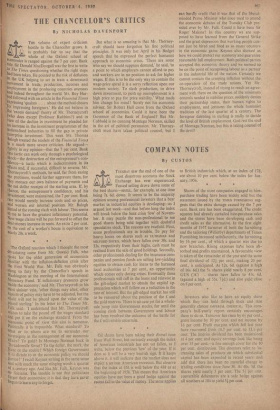THE CHANCELLOR'S CRITICS
By NICHOLAS DAVENPORT THE volume of expert criticism hostile to the Chancellor grows. It , s is probably fair to say that the
whole of the Oxford school of economics is ranged against the 7 per cent. Bank rate,, Sir Donald MacDougall was the first to write to 1he Times questioning whether the right steps had been taken. He pointed to the risk of deflation Hi the UK helping to set in train a downward movement in trade, production, incomes and employment in the producing countries overseas and Indeed throughout the world. Mr. Roy Har- rod followed with an article in the Financial Times expressing 'qualms . . . about the method chosen for impressing foreigners.' He did not believe in the 'excess demand' theory of Mr. Thorneycroft (who does except Professor Robbins?) and in view of the decline in investment he pleaded for an increase in the investment programmes of the nationalised industries to fill the gap in private enterprise investment. This week Mr. Thomas Balogh treated the readers of the Financial Times to a much more severe criticism. He argued— rightly in my opinion—that the 7 per cent. Bank rate tactic can work only through a psychological shock—the destruction of the entrepreneur's con- licence—a tactic which is indiscriminate in its eflects and, if successful, difficult to reverse. Mr. Thorneycroft's methods, he said, far from easing Our problems, would further aggravate them, for they menace our own balance of payments and the net dollar receipts of the sterling area. If, by Chance, the entrepreneur's confidence, and his investment, were maintained, the 7 per cent. Bank rate would merely increase costs and so prices, and worsen our internal position. Mr. Balogh hinted at the coming clash with labour. This seems to me to have the greatest inflationary potential. N =w wage claims will be put forward to offset the dear-money increase in rents. An extra 2 per cent. Oil the cost of a worker's house is equivalent to nearly 20s, a week.
The Oxford reaction which I thought the most devastating came from Mr. Oswald Falk, who Sp..)ke for thp older generation of economists familiar with the inflation-deflation crisis after the First World War. Mr. Falk was obviously stung to fury by the Chancellor's speech in Washington at the meeting of the International Monetary Fund. 'If inflationary pressures grow ittade the economy,' said Mr. Thorneycroft in his n1)st sinister vein, 'other things may alter, other aspects of policy may have to be adjusted, but the strain will not be placed upon the value of the Pound sterling.' In his letter to The Times Mr. Nik said: 'I understand that Mr. Thorneycroft wishes to take the pound off the wages standard and put it on the exchange standard. From the eeonoinic point of view this aim is nonsense. Politically it is impossible. What standard? To Uhat or to whom are we to surrender our sovereignty in the management of our economic affairs? To gold? Is Montagu Norman back in Threadneedle Street? To the dollar, the mark, the franc or the rouble? Which foreign Government is to dictate to us the economic policy we should Pursue?' I recall Keynes writing in the same sense d with much the same stinging words a quarter ot a century ago. And like Mr. Falk, Keynes was 110 Socialist. The trouble is not that politicians forget their economics; it is that they have never begun to learn any to forget.
But what is so amazing is that Mr. Thorney- croft should have forgotten his fine political principles. It was only last April in his Budget speech that he expressed the perfect humanist approach to economic crises. 'There are some who say we should suppress demand,' he said, `to a point to which employers cannot afford to pay and workers are in no position to ask for higher wages. If this is to be the only way to contain the wage-price spiral it is a sorry reflection upon our modern society. To slash production, to drive down investment, to push up unemployment is a high price to pay for price stability.' What made him change his mind? Surely not his economic adviser. Sir Robert Hall came from the Oxford school of economics. Could it have been the Governor of the Bank of England? But Mr. Cobbold is no cunning Montagu Norman, skilled in the art of political persuasion. Mr. Thorney- croft must have taken political counsel, but I can hardly credit that it was that of the liberal- minded Prime Minister who once used to attend the ,economic debates of the Tuesday Club pre- sided over by Mr. Falk. Could it have been Sir Roger Makins? In this country we are sup- posed to have learned from the General Strike and the great depression that working people can- not just be hired and fired as so many counters in the economic game. Keynes also showed us how we could protect our economy and guarantee reasonably full employment. Both political parties accepted this economic theory and we seemed to be on the point of recognising labour as a partner in the industrial life of the nation. Certainly we cannot contain the creeping inflation without the co-operation of the trade unions. Yet Mr. Thorneycroft, instead of trying to reach an agree- ment with them on the question of the minimum controls needed to stabilise prices, suddenly denies their partnership status, their human rights to employment, and jettisons the whole humanist tradition of the last quarter of a century. The foreigner dabbling in sterling is really to decide the level of British employment. God rest the soul of Montagu Norman, but this is taking counsel of the devil !






















































 Previous page
Previous page